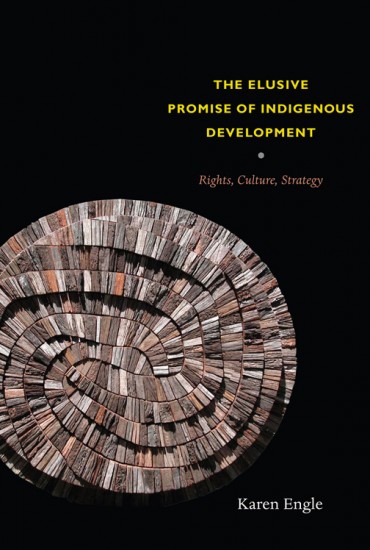“Comprehensive, original, historically grounded, timely, policy relevant, and probing about the responsibility of scholars.” These are words used by the American Political Science Association’s Section on Human Rights in awarding its 2010 Best Book Award prize to Karen Engle, Cecil D. Redford Professor in Law and director of the Rapoport Center for Human Rights and Justice.
Engle’s book, The Elusive Promise of Indigenous Development: Rights, Culture, Strategy, explores the international legal frameworks and strategies used to pursue indigenous peoples’ claims to heritage, territory, and economic development. Focusing primarily on the Americas, she describes how cultural rights have emerged over self-determination as the dominant framework for indigenous advocacy in the late twentieth century, bringing what she argues are unfortunate if unintended consequences. Specifically, she contends that indigenous rights advocates have made concessions that threaten to exclude many claimants, force others into norms of cultural cohesion, and limit indigenous economic, political, and territorial autonomy. She then considers how some of these same dynamics have played out in relation to Afro-descendant territorial rights claims in Latin America, specifically Colombia.
The American Political Science Association Section on Human Rights promotes research in international human rights, and the policies and organizations that influence them. Professor Mahmood Monshipouri of San Francisco State University, who chaired the selection committee for the award, said the book was the referees’ unanimous favorite of the more than thirty books nominated for the award. The American Political Science Association will present Engle with the award at its annual meeting in Seattle, Washington, in September.
“It is especially rewarding to be recognized by scholars across disciplinary boundaries,” Engle said. “Such recognition is a reminder of the interdisciplinary nature of human rights work, and a reaffirmation of the larger project in which I have been engaged to build an interdisciplinary community in the study and practice of human rights. The book is in many ways a product of interdisciplinary encounters I have been fortunate to have through the Rapoport Center for Human Rights and Justice.”
The Rapoport Centerfor Human Rights and Justice was created in 2004 to promote a multidisciplinary approach to the study of human rights issues, to spur innovative research, and to collaborate with advocates aimed at the economic and political enfranchisement of marginalized individuals and groups. Guided by Engle’s leadership and scholarship—she is also a faculty member of Latin American Studies as well as Gender and Women’s Studies—the Rapoport Center has engaged in a number of projects focused on the collective rights of indigenous peoples and Afro-descendants in Latin America.
After the publication of The Elusive Promise of Indigenous Development, Engle gave related lectures in Colombia and Italy, and published articles based on those lectures in Revista de Derecho Público and the European Journal of International Law.
She is also working on two new book projects that focus on her primary research interest in social movements and international law. One continues her examination of Afro-descendant land rights by comparing the law in Colombia that she discusses in The Elusive Promise of Indigenous Development with similar regimes for collective land rights for Afro-descendants in Brazil and Ecuador. The other traces the history of the contemporary transnational women’s rights movement and its relationship with various international legal institutions.


